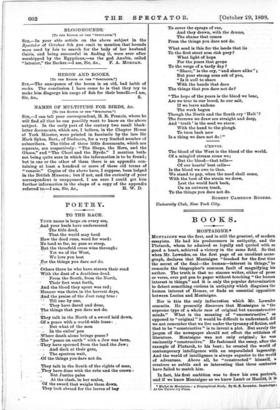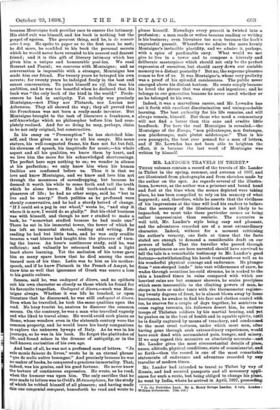BOOKS.
MONTAIGNE.*
MONTAIGNE was the first, and is still the greatest, of modern essayists. He had his predecessors in antiquity, and the Plutarch, whom he admired so loyally and quoted with so good a heart, achieved a victory in the same field. So that, when Mr. Lowndes, on the first page of an excellent mono- graph, declares that Montaigne "touched for the first time the secret of the final—the human—interest in things," he commits the biographer's common fault of magnifying his author. The truth is that no sincere writer, either of prose or verse, ever put pen to paper without touching " the human interest in things," and it is only the popular determination to detect something curious in antiquity which disguises the human interest of Homer, or finds an essential opposition between Lucian and Montaigne.
Nor is this the only indiscretion which Mr. Lowndes commits. He presently discovers that Montaigne is "the supreme type of a whole race of original but unconstructive minds." What is the meaning of "unconstructive" as opposed to "original" it would be difficult to understand, did we not remember that we live under the tyranny of fiction, and that to be " constructive " is to invent a plot. But surely the jargon of the newspaper should not effect the criticism of literature. Montaigne was not only original; he was eminently "constructive." He fashioned the essay, after the example of Plutarch, to his bent; he created the world of contemporary intelligence with an unparalleled ingenuity. And the world of intelligence is always superior to the world of adventure. Above all, he "constructed" himself, a creature so subtle and so interesting that three centuries have failed to match him.
In fact, his first ambition was to draw his own portrait., and if we know Montaigne as we know Lamb or Hazlitt, it is
• Michel de Montaigne : a Biographical Study. By M. B. LoTades. Cambridge: At the Univeniry Press. because Montaigne took peculiar care to ensure the intimacy. His chief cult was himself, and his book is nothing but the gospel of egoism. The greatest thing, said he, is de scavoir estre a, soy. He spoke to paper as to the first man he met; he did more, he confided to his book the personal secrets which he would never have revealed to his nearest and dearest friend ; and it is this gift of literary intimacy which has given him a unique and honourable position. We read Bossuet and Pascal; we converse with Montaigne; and as conversation is impossible with a stranger, Montaigne has made him our friend. For twenty years he betrayed his own secrets ; for twenty years he indulged freely in the best and sanest conversation. To paint himself au vif, that was his ambition, and he was too boastful when he declared that his book was "the only book of the kind in the world." Prede- cessors he had in antiquity. Yet nobody was precisely Montaigne,—not Pliny nor Plutarch, nor Lucian nor Athenteus. They all showed the way ; they all proved that the Frenchman was not born a ready-made inventor. But Montaigne brought to the task of literature a frankness, a self-knowledge which no philosopher before him had com- pletely realised. And for so doing he may, perhaps, claim to be not only original, but constructive.
In his essay on " Presumption" he has sketched him- self, and thus given us a key to all his essays. His mean stature, his well-compacted frame, his face not fat but full, his slowness of speech, his inaptitude for music,—his whole aspect and all his qualities, we know them by heart, and we love him the more for his acknowledged shortcomings. The perfect hero says nothing to us ; we wonder in silence at his perfection; we only know him when his human frailties are confessed before us. Thus it is that we love and know Montaigne, and we know and love him not through the meanness of eavesdropping, but because he deemed it worth his while to come forth and tell the truth which he alone knew. He held tooth-and-nail to the pleasures of life; he had no other scope, said he, "but to live and be merry." Such politics as he professed were sternly conservative, and he had a sturdy hatred of change. "If I could set a peg in our wheel," wrote he, "and stay it where it is now, I would do so gladly." Bnt his chief business was with himself, and though he nev r studied to make a book, he "somewhat studied because be had made one." There he sat in his immortal tower, the tower of which he has left an immortal sketch, reading and writing. For reading he had but little taste, and be was only erudite because a vast leisure had taught him the pleasure of turn- ing the leaves. An hour's continuous study, said he, was sufficient; and valiantly he esteemed health and a light heart above learning. Yet the seclusion of his tower gave him so many spare hours that he died among the most learned men of his time. Latin was to him as his mother- speech, and if he knew Plutarch in the French of Amyot, he knew him so well that ignorance of Greek was scarce a loss to his gentle culture.
Seneca, said he, was ondoyant et divers, and no epithets snit his own character so closely as those which he found for his favourite tragedian. Ondoyant et divers,—such was Mon- taigne always. Whether it was life he touched, or upon literature that he discoursed, he was still ondoyant et divers. Even when he travelled, he took the same qualities upon the road. No busy tourist he, anxious to discover the common secrets. On the contrary, he was a man who travelled vaguely and who liked to travel alone. He would avoid such places as Rome, whose wonders even in the sixteenth century were the common property, and he would leave his hasty companions to explore the unknown byways of Italy. As he was in his journeys, so he was in his book. He forgot the platitudes of life, and found solace in the dreams of antiquity, or in the half-known curiosities of his own age.
And best of all, he was not a professed man of letters. "Je snis moths faisenr de livres," wrote he in an eternal phrase "que de nulle aultre besongne." And precisely because he was no maker of books, he conquered a gracious immortality. That, indeed, was his genius, and his good fortune. He never knew the torture of continuous expression. He wrote, as he read, when the humour was upon him. The only sacrifice that he ever made to letters was to Ovid's Metamorphoses, for the study of which he robbed himself of all pleasure; and having made this one congenial conquest, henceforth he read and wrote to please himself. Nowadays every pursuit is twisted into a profession ; a man reads or writes because reading or writing is his business; even literature too soon becomes the hack's ungrateful pursuit. Wherefore we admire the more keenly Montaigne's invincible placidity, and we admire it, perhaps, with a spice of pardonable envy. What would we not give to live in a tower and to compose a leisurely and deliberate masterpiece which should not only be the perfect expression of ourselves, but should carry down our amiable memory to a distant posterity F But no, the supreme pleasure comes to few of us. It was Montaigne's, whose very prolixity was a proof of his splendid carelessness. The public never emerged above his distant horizon. He wrote simply because he loved the phrase that was simple and ingenious; and he belongs to our generation because he never cared whether or no he belonged to his own.
Indeed, it was a marvellous career, and Mr. Lowndes has set it forth with excellent discrimination and unimpeachable learning. The best authority for his life remains, and will always remain, himself. But those who need a commentary will not find a better than this sane and erudite little handbook. For here the real Montaigne is revealed,—the Montaigne of the Essays, "non pedantesque, non fratesque, non plaideresque, mais pintot soldatesque." That is his own panegyric, the best ever penned for a man of letters, and if Mr. Lowndes has not been able to heighten the effect, it is because the last word of Montaigne was written by himself.







































 Previous page
Previous page